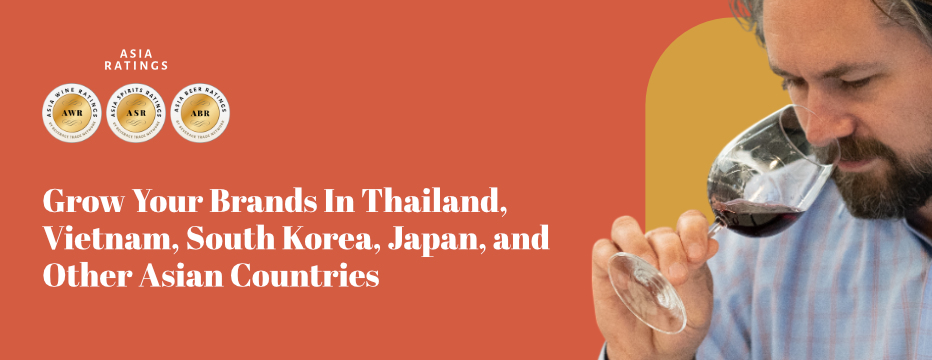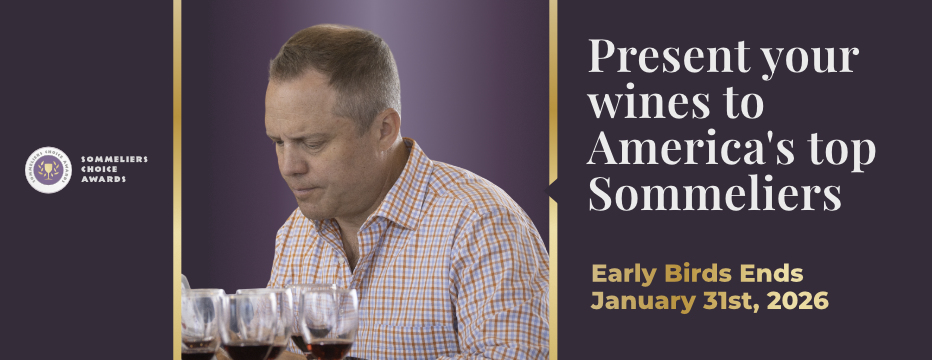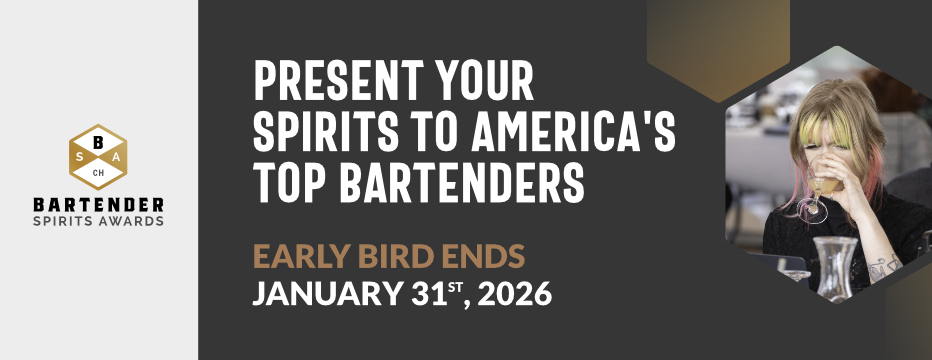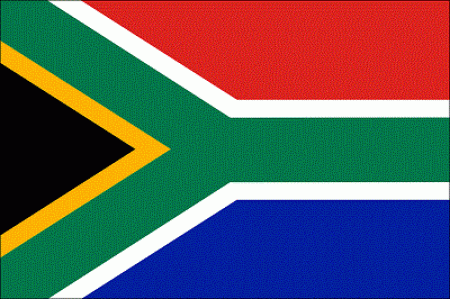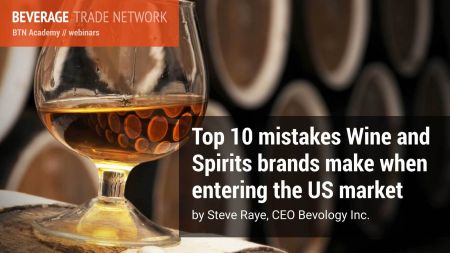Sommeliers Choice Awards 2025 Winners
Navigating New Frontiers: Masato Hayashi on APISWA’s Vision for the Asia-Pacific Spirits Market
Building a Responsible Spirits Industry: APISWA's Role in a Dynamic Asia-Pacific
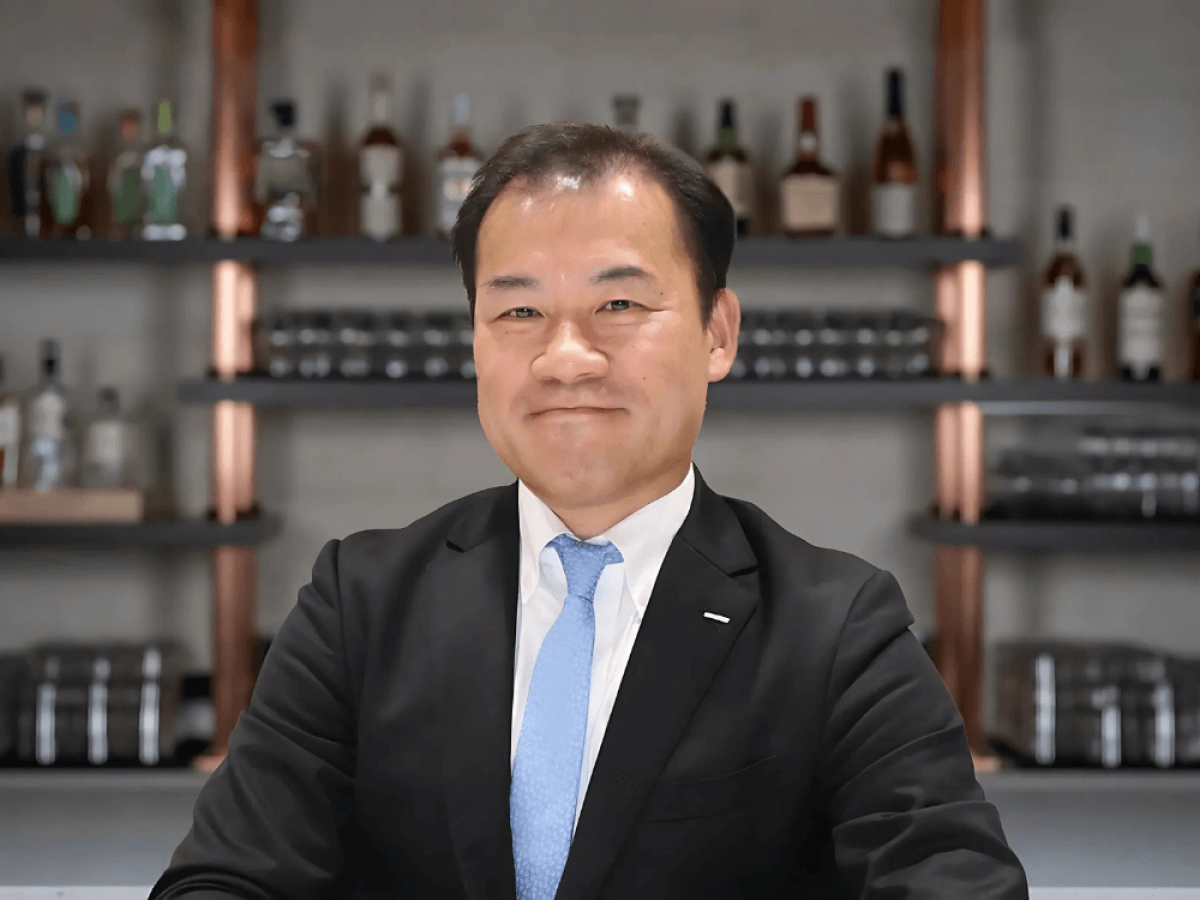
As Chairman of the Asia Pacific International Spirits and Wines Alliance (APISWA) and President of Suntory Global Spirits, Masato Hayashi is at the helm of navigating a complex and rapidly changing market. The Asia-Pacific region, with its cultural diversity, evolving regulations, and dynamic consumer trends, presents both significant challenges and unparalleled opportunities for global spirits and wine producers. In this interview, Hayashi sheds light on APISWA’s long-term vision, outlining how the alliance is shaping the future of the industry by promoting responsible drinking, fostering regulatory harmony, and supporting sustainable business practices that align with both local and global goals.
Masato, could you tell us more about APISWA’s long-term vision and current top priorities? How are these evolving in response to regional economic policies and trade developments across the Asia-Pacific?
The Asia Pacific International Spirits and Wines Alliance (APISWA) proudly represents 11 global spirits and wine producers operating across the Asia-Pacific region. APISWA member companies include Bacardi, Brown Forman, Campari, Diageo, Edrington, Moët Hennessy, Pernod Ricard, Proximo, Remy Cointreau, Suntory Global Spirits, and William Grant & Sons.
APISWA envisions a future where legal spirits and wine are enjoyed responsibly by all those who choose to drink. We work to advance regulatory environments that bolster local economies and promote responsible drinking, tailoring our approach to fit local contexts while aligning with international best practices.
Our key priorities include:
1) Responsibility: We are dedicated to advancing responsible drinking practices and have invested in educational and awareness campaigns across the region. Our flagship program, 'The Power of No', is a testament to this commitment, actively combating drunk driving across Southeast Asia. To date, our responsibility message has reached over 40 million beneficiaries across the region. We strongly oppose the consumption of alcohol by those under the Legal Drinking Age (LDA) and have been supporting the introduction of a Legal Drinking Age in markets like Cambodia.
2) Regulation: We work diligently with stakeholders to ensure a regulatory environment that safeguards consumer interests and safety, including by combatting illicit alcohol. Our goal is to foster a competitive business environment that supports a dynamic, sustainable, and responsible hospitality industry, where those who choose to drink do so in moderation and without running the risk of consuming illicit or counterfeit products.
3) Tourism & Hospitality: Recognizing the Asia-Pacific region as a vibrant tourism destination, APISWA is committed to enhancing this sector's contribution to GDP and employment. We work to promote responsible and sustainable policies that recognize premium products as central to a country’s tourism offering and to unleash higher tourism expenditure. To this end, we have partnered with Oxford Economics on a series of reports highlighting the economic contribution of our sectors to tourism and hospitality.
4) Sustainability: Our members are progressively focusing on sustainability, both in their production processes and throughout their supply chains. As an industry, we are expanding our understanding of sustainable practices and leading pilot initiatives to evaluate how we can further reduce our sector's environmental footprint, for instance with regards to glass packaging.
5) International Trade: APISWA takes an active interest in regional economic policy development and trade negotiations. We keep a close eye on the evolving landscape, including trade agreements such as the Comprehensive and Progressive Agreement for Trans-Pacific Partnership (CPTPP) and the Regional Comprehensive Economic Partnership (RCEP) – ensuring that consumers, regulators, and businesses all benefit from the dismantling of tariff and non-tariff barriers.

Image: A Public Awareness Campaign by AAV & APISWA - “The Power Of No”.
With major global members like Bacardi, Moët Hennessy, and Diageo, how does APISWA balance the global goals of these companies with the unique challenges and opportunities in diverse Asia-Pacific markets, especially considering each country’s regulatory landscape and cultural context?
The strength of APISWA lies in its diverse membership, comprising respected international wine and spirits producers from across the world. As alcohol producers, our members are deeply committed to their responsibilities, prioritizing the safety of consumers and advocating for the moderate enjoyment of alcohol by those who choose to drink.
Our diverse and engaged membership enables us to draw from a wealth of experiences and best practices worldwide. We adapt these insights to fit local contexts and cultural nuances, learning from both successful initiatives and past challenges. We actively foster dialogue between our members and local stakeholders, which include governments, industry bodies, and local organizations. This ongoing communication helps us align our members' objectives with local needs and expectations, promoting mutual understanding and cooperation across a range of initiatives. This approach ensures that we are not only meeting global standards – for instance, in relation to Marketing Codes of practice – but also responding effectively to the needs and realities of each local market.
Illicit and unrecorded alcohol trade remains a significant issue in Southeast Asia. How is APISWA collaborating with local governments and stakeholders to combat this? What have been some key successes, and what challenges still need to be addressed?
According to the World Health Organization, approximately 25% of global alcohol consumption is unrecorded, and regrettably, the issue of illicit and unrecorded alcohol is a significant concern across numerous markets in the Asia Pacific region. The widespread presence of illicit alcohol stems from a complex mix of factors, with affordability constituting a primary point of attraction for consumers, particularly those less affluent.
To tackle this issue, APISWA has been backing a variety of initiatives. These include capacity-building efforts designed to enhance the capabilities of enforcement agencies – including Customs and Consumer Protection Organization – and public awareness campaigns aimed at educating consumers about the dangers associated with illicit alcohol (e.g. our “Drink Authentic, Enjoy Responsibly” campaign in the Philippines). Furthermore, APISWA members engage in dialogue with stakeholders to promote regulatory best practices and work towards the creation of an operating environment that minimizes incentives for the production and distribution of illicit and unrecorded alcohol.
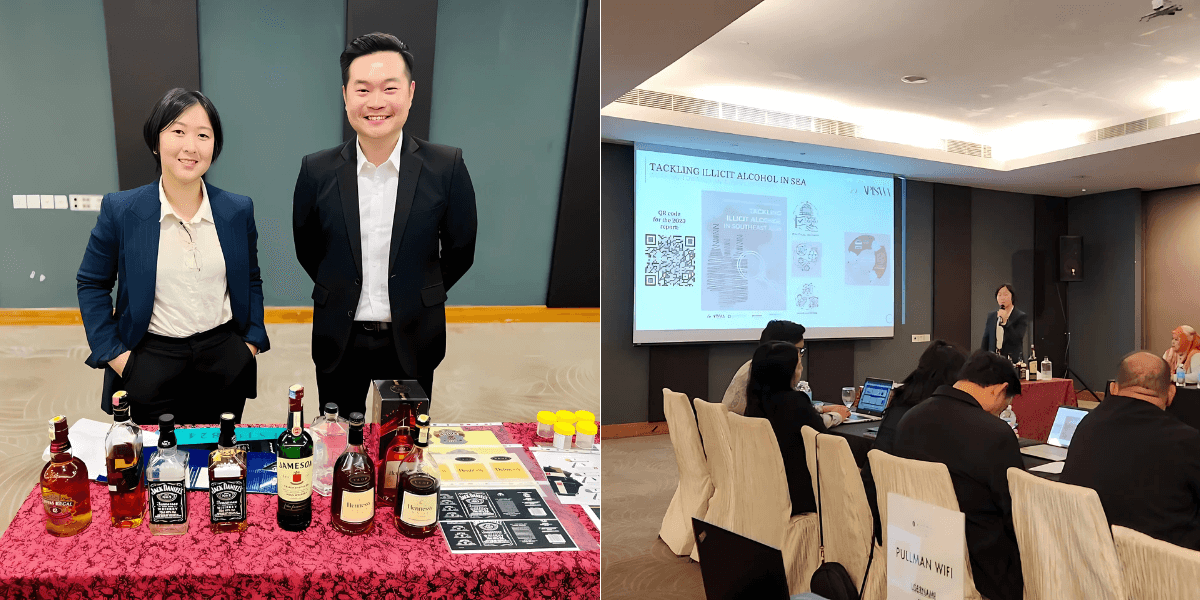
Image: APISWA - Public Affairs & Programmes Manager, Audre Ang, alongside Chen Yun Jin from the Law Partnership, delivered interactive presentations that educated 40 customs officials from ASEAN Member States, Timor-Leste, and the ASEAN Secretariat. Source: APISWA.
Taxation is a major concern for spirits and wine producers. How is APISWA advocating for fair and equitable tax policies across Southeast Asia, and what impact do you anticipate this will have on imports and exports in the region?
APISWA members advocate for fair and equitable taxation of wine and spirits products, akin to the taxation of other goods. We firmly believe that all alcoholic beverages should be taxed in an equitable manner, which is currently not the case. For instance, there remain discriminatory practices that negatively impact the market for legal international wine and spirits products.
Such practices include instances where imported products are subjected to higher excise taxes versus directly competitive, or substitutable, domestically produced products. This is in violation of World Trade Organization (WTO) rules. APISWA members also seek to address alcohol taxation policies that discriminate or differentiate based on the type of alcohol in products, regardless of their alcohol content. This is apparent in markets where excise duties, and occasionally marketing restrictions and availability constraints, vary between alcoholic beverages.
The association is actively engaged with stakeholders across the region to promote policies compliant with World Trade Organization principles. We also continue to advocate for evidence-based tax and regulatory measures that maximize revenue for governments, without overburdening consumers or hindering business growth, and reduce the economic incentives that allow informal markets – such as the trade in unrecorded and illicit alcohol products – to flourish.
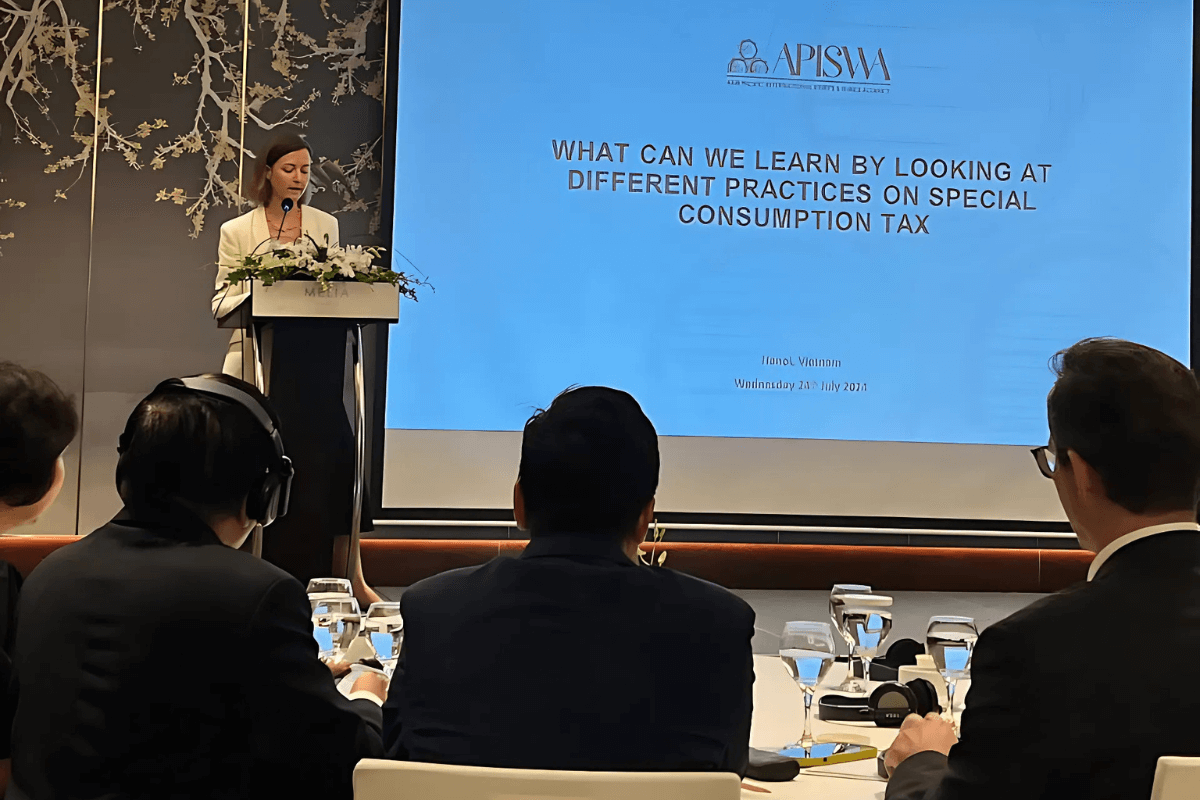
Image: APISWA, in partnership with EU-ASEAN Business Council, EuroCham Vietnam Wine and Spirits Sector Committee, and supported by Vriens & Partners, hosted a Tax Policy Round Table in Hanoi on 24 July 2024. Source: APISWA
Many APISWA member companies have set ambitious sustainability goals. Could you highlight some of the most impactful environmental initiatives in the region? How do these efforts align with regional sustainability frameworks and local government policies?
International wine and spirits companies, including APISWA members, have established a variety of ambitious sustainability goals at a global level. These encompass areas that are aligned with the UN’s Sustainable Development Goals, such as Tackling Climate Change, Preserving Water Resources, and Moving to a Circular Economy. All individual company commitments in these areas are detailed in the respective annual or sustainability reports of APISWA member companies.
In addition to integrating sustainability into their production processes and supply chains, APISWA members in the region are broadening their understanding of sustainable practices in local markets. This includes spearheading pilot initiatives to assess how the sector's environmental footprint can be further reduced – for instance in the glass recycling space in Malaysia. APISWA has backed pilot glass recycling initiatives and crucial research to comprehend the capacity and readiness of domestic recycling sectors, in anticipation of the development of enhanced producer responsibility (EPR) or container deposit return (DRS) schemes.
APISWA is committed to fostering a strong hospitality and tourism sector across Southeast Asia. How does APISWA collaborate with local governments to support these industries, especially in the face of global economic fluctuations?
According to the World Travel & Tourism Council, in 2023 the Travel & Tourism sector contributed 9.1% to the global GDP and accounted for close to 330m jobs worldwide. Similarly, tourism remains a vital sector in the Southeast Asia region, where it generates approximately 12% of GDP and provides around 11% of employment.
The products of APISWA members constitute a key part of the tourism and hospitality offering – particularly when it comes to premium tourism experiences and capturing higher-quality tourism growth. For instance, a recent report by economic research firm Oxford Economics indicated that food & beverage experiences are amongst the most important factors in choosing a travel destination. Their analysis showed that travelers were up to 2.5 times more likely to choose destinations that offered a high quality, wide variety, and convenient access to food & beverage experiences, versus those destinations with more limited offerings.
Separate findings from Oxford Economics’ impact assessment on the economic contribution of the international wine and spirits value chain in Thailand and Vietnam, highlighted how this sector supports over 85,000 jobs and close to $500m in economic contribution in these two countries. This report also indicated how capturing the premium market can help promote the recovery and diversification of the tourism industry, and can make destinations more attractive to higher-spending tourists.
These findings speak to the importance of ensuring that policy and regulation are supportive of attracting high-value tourists. As part of this, APISWA partners with stakeholders across the region that wish to focus on high-value tourism growth, to understand how both the private and public sectors can enhance ‘premium experiences’ that unleash greater spending per trip – and generate greater socioeconomic returns from tourism – while delivering value-for-money for travelers.
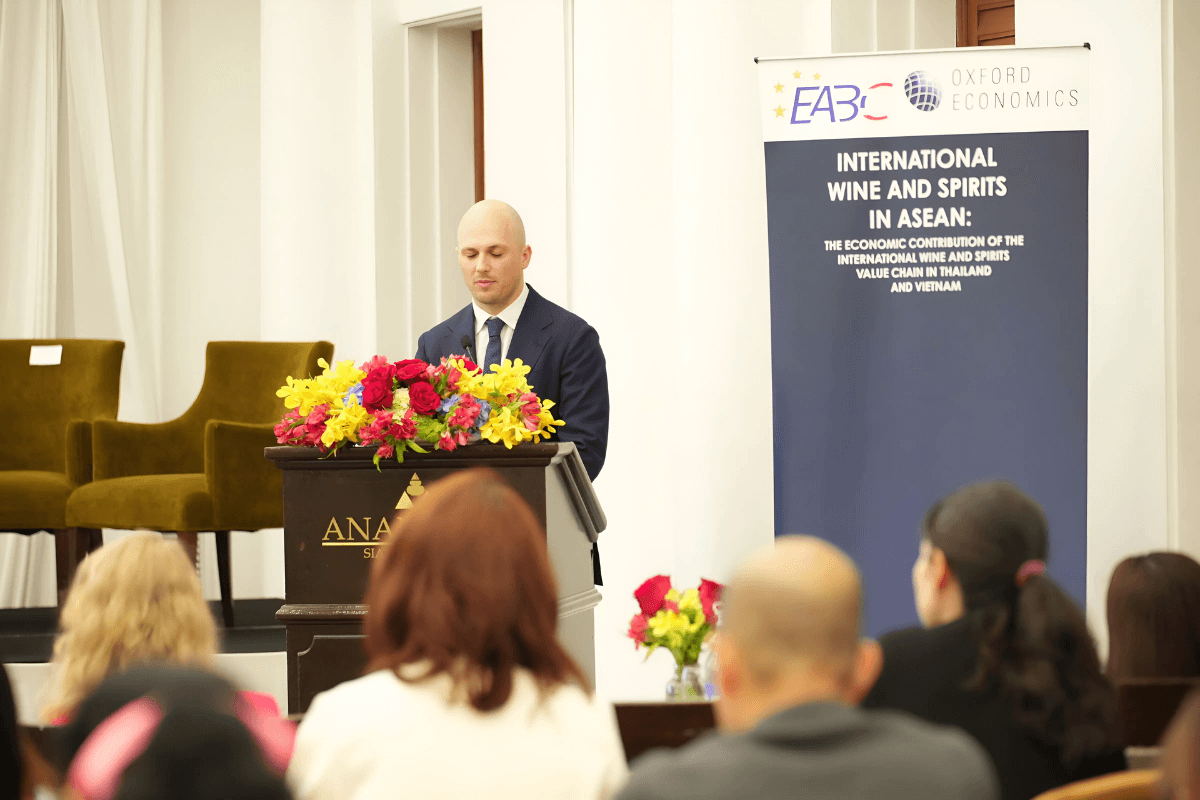
Image: Lead Economist, Liam Cordingley at Oxford Economics reports that international wine and spirit sales and distribution make a significant economic contribution to Thailand. Source: APISWA
Partnerships, such as the recent collaboration with ASEAN customs officials, play a crucial role in achieving APISWA’s objectives. How important are these partnerships, and are there any new collaborations or initiatives on the horizon that you are particularly excited about?
Partnerships are key to everything that we do. Without trusted partners, APISWA would not be able to have the same reach and deliver the same impact through its programming and initiatives. For instance, we are very proud of our ongoing collaborations with the likes of the Automobile Association of Vietnam who are helping us promote responsible drinking habits and save lives by changing cultural norms around drink-driving. We have also supported a series of training programs on illicit alcohol, spearheaded with the support of the Transnational Alliance to Combat Illicit Trade (TRACIT). There’s more to come, so watch this space!
In which areas do you believe more regulatory alignment is necessary to support the spirits and wine industry?
Regulatory alignment is critical to avoiding cumbersome duplication while still providing consumer safety and guaranteeing essential standards and product conformity with regulatory requirements. One area that would benefit from greater regulatory alignment is labeling. In this space, while objectives are usually shared across jurisdictions – for instance on the need to provide important information to consumers, including provenance and health-related information – there remains significant variation between national regulations. This subsequently undermines efforts to establish essential common standards, hampers innovation, increases administrative burden and impacts business certainty. One solution that the industry has been proposing involves digital labeling. Digital labels offer a number of advantages including the ability to provide more information ‘on pack’, a reduced environmental impact as well as improved accessibility, flexibility, and cost efficiency versus traditional physical labels.
The Asia-Pacific region is one of the most dynamic markets in the world. How is APISWA helping its members adapt to emerging trends like premiumization, the growth of the low and no-alcohol segment, changing consumer preferences, and the increasing role of e-commerce in the wine and spirits market?
In this incredibly dynamic region, APISWA’s role is to expand industry codes of practices and responsibility initiatives, while ensuring that its members can count on non-discriminatory and sustainable regulatory environments that grant consumers access to safe and legal wine and spirits products. Specifically on e-commerce, APISWA will continue working on advancing greater e-commerce freedoms, while simultaneously growing industry-wide responsibility frameworks, such as the Online Alcohol Sale & Delivery Code of Conduct.
“Premiumization”, the broad trend of consumers opting to ‘trade up’ in their consumption choices by purchasing better quality products and drinking better, not more, is vital to APISWA member companies. Open, robust, and predictable operating environments are needed to meet growing consumer demand for such products while ensuring that the industry can continue to contribute to sustainable economic growth through employment and revenue generation.
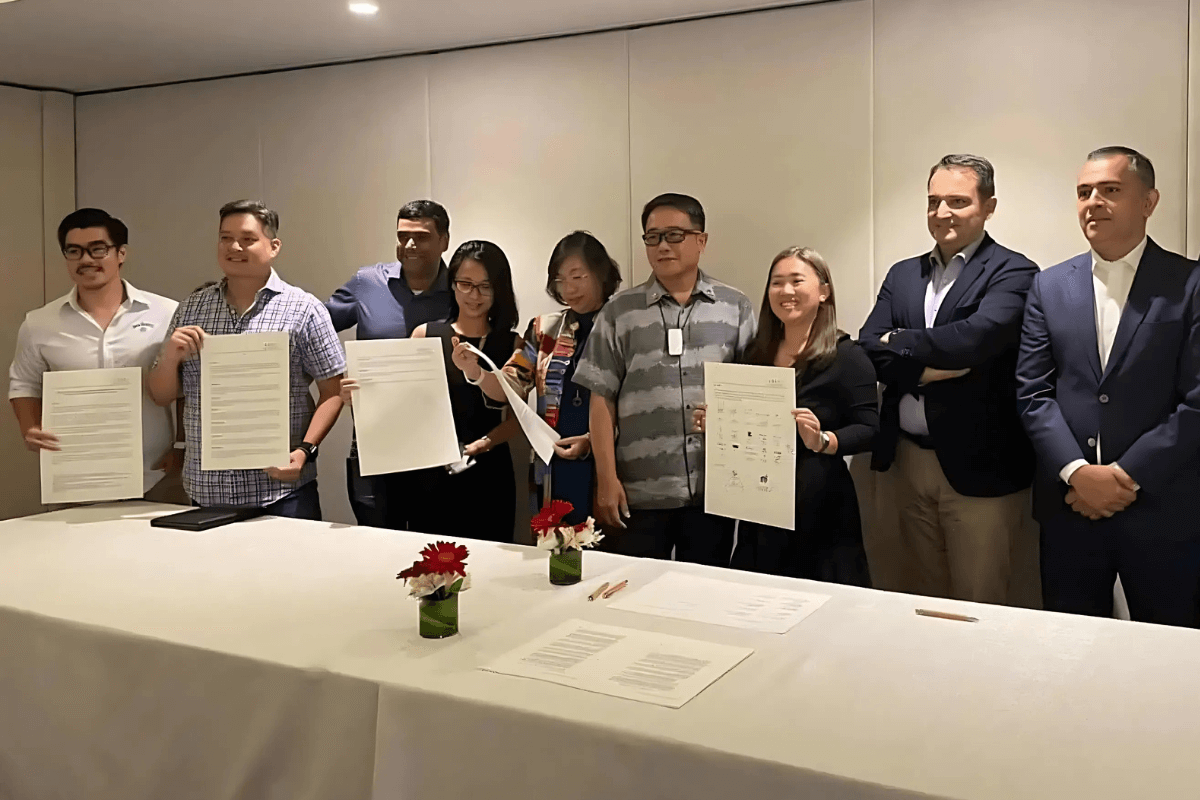
Image: The launch of the eCommerce pledge and IPOPHL MoU signing ceremony took place on the sidelines of the recent APISWA Mission to the Philippines. Source: APISWA.
Conclusion:
Under Masato Hayashi’s leadership, APISWA is forging a path toward a more responsible, sustainable, and competitive spirits industry in the Asia-Pacific. By collaborating with governments, local stakeholders, and international producers, the alliance is tackling key issues such as illicit trade, fair taxation, and sustainability while promoting responsible consumption and enhancing the region’s hospitality and tourism sectors. As the global spirits landscape continues to evolve, APISWA's proactive and tailored approach ensures its members can navigate these changes while contributing positively to the local economies and societies they serve.
In conversation with Malvika Patel, Editor and VP, Beverage Trade Network
Also Read:
Inside Bacardi: Stephanie Macleod’s journey in Scotch whisky blending
Joaquin Gonzalez Elevating Campari's Icons in Latin America
Leading Tomorrow: Insights from Diageo’s Chief Innovation Officer

